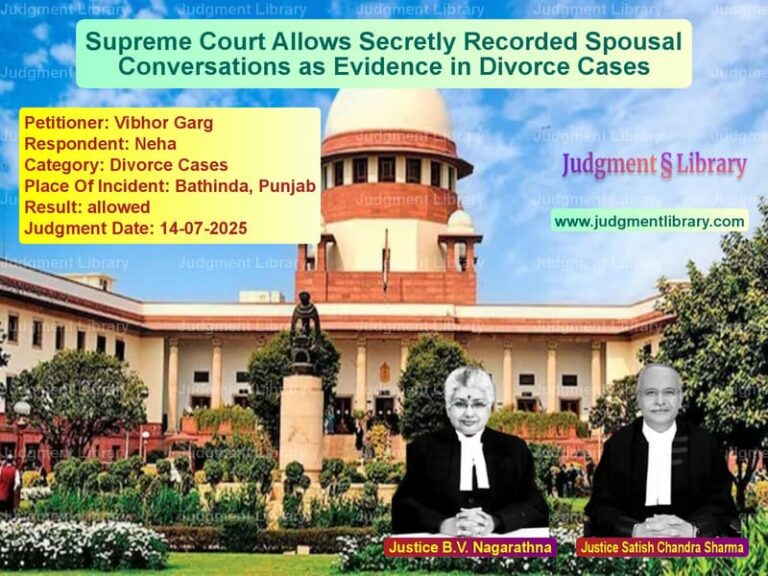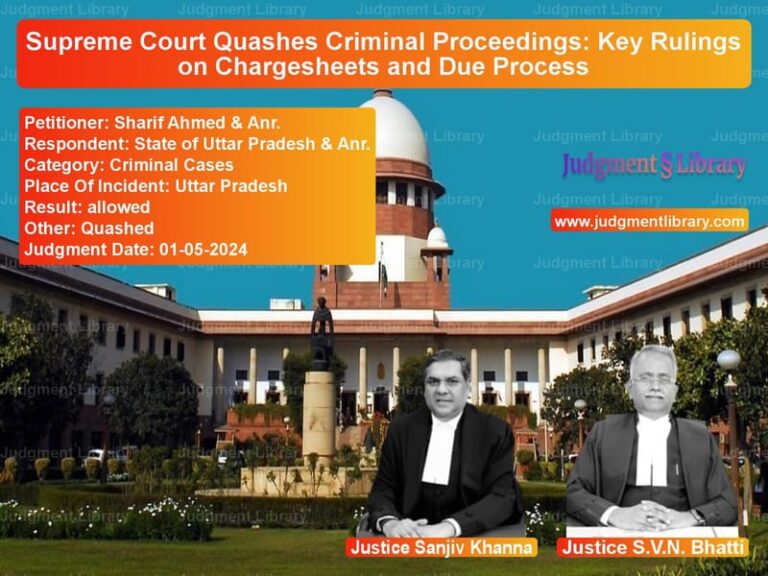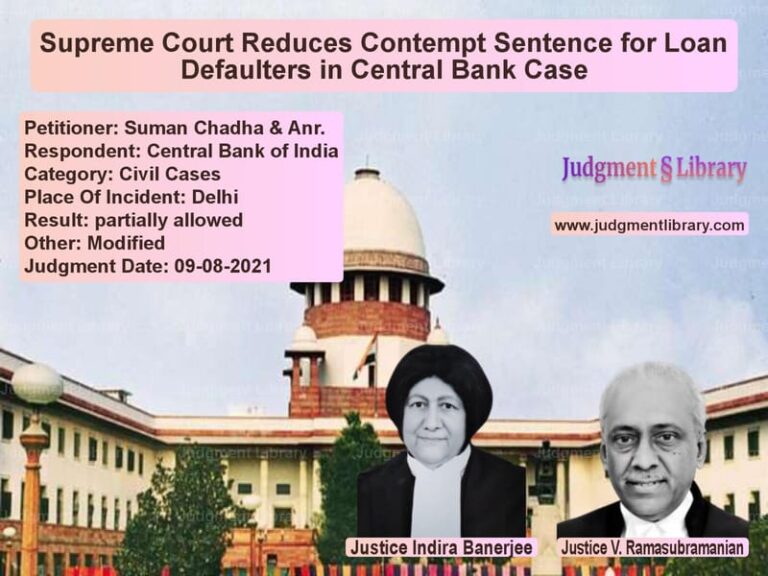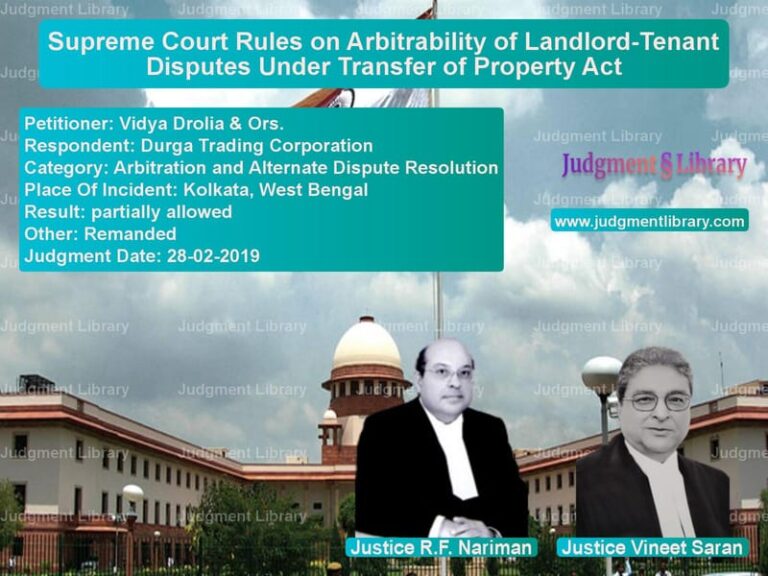Arbitration Award Cannot Be Enforced if It Violates Fundamental Policy of Indian Law: Supreme Court Ruling
The case of Ratnam Sudesh Iyer vs. Jackie Kakubhai Shroff revolves around the enforcement of an arbitration award and whether it could be set aside under Section 34 of the Arbitration and Conciliation Act, 1996. The Supreme Court examined whether an arbitral award that disproportionately favored one party could be sustained under Indian law.
Background of the Case
The dispute between the appellant and respondent arose from their business association, which involved shareholding in an investment holding company named Atlas Equifin Private Limited (Atlas). The company held 11,05,829 equity shares in Multi-Screen Media Pvt. Ltd. (MSM). The appellant had been attempting to sell the shares in MSM since 2002, and in 2005, both parties signed a placement instruction authorizing Standard Chartered Bank to find a buyer. However, the respondent later claimed that his signatures on the placement instruction were forged and filed a complaint with the Economic Offences Wing (EOW) of Mumbai Police.
Subsequently, the parties entered into a Deed of Settlement on 3rd January 2011 to resolve their disputes, under which:
- The respondent agreed to withdraw all complaints and proceedings against the appellant.
- The respondent was not to write to any judicial or statutory authority about the matter.
- The appellant was to pay the respondent a total of US$ 3.5 million in two parts: US$ 1.5 million in escrow to be released after confirmation of complaint withdrawal and US$ 2 million within seven days of receiving proceeds from the sale of MSM shares.
- A clause in the Deed of Settlement stipulated that if the respondent breached the agreement, he would forfeit his right to the payment.
- The settlement agreement contained an arbitration clause under which disputes would be resolved by arbitration.
Trigger for Arbitration
The appellant alleged a breach of the settlement agreement due to two emails sent by the respondent’s wife on 9th and 15th June 2011, which contained disparaging remarks against the appellant. Based on this, the appellant initiated arbitration proceedings seeking a refund of US$ 1.5 million and cancellation of the remaining US$ 2 million payment.
Arbitration Proceedings
The arbitrator ruled in favor of the appellant, holding that the respondent had violated the settlement agreement and must return the US$ 1.5 million while forfeiting the remaining payment. The respondent challenged this award under Section 34 of the Arbitration Act before the Bombay High Court, which set aside the award, concluding that:
- The emails from the respondent’s wife could not constitute a breach by the respondent himself.
- The respondent had fulfilled his primary obligations under the settlement agreement by withdrawing the complaint.
- The award violated the fundamental policy of Indian law by imposing a disproportionate penalty.
The appellant then approached the Supreme Court.
Arguments by the Appellant (Ratnam Sudesh Iyer)
- The arbitration award was valid under the settlement agreement, as the respondent’s actions amounted to a breach.
- The High Court exceeded its jurisdiction under Section 34 by reviewing the merits of the dispute.
- The court could not interfere with an arbitration award unless it violated fundamental policy, which the appellant argued was not the case.
Arguments by the Respondent (Jackie Kakubhai Shroff)
- The arbitration award imposed an excessive penalty for a minor email exchange.
- The High Court rightly concluded that there was no actual breach of the settlement agreement.
- The award resulted in an unjust enrichment of the appellant and violated principles of fairness.
Supreme Court’s Observations
The Supreme Court, comprising Justices Sanjay Kishan Kaul and M.M. Sundresh, analyzed the applicability of Section 34 of the Arbitration Act to the case.
The Court ruled that:
- The test for setting aside an arbitral award is whether it violates the fundamental policy of Indian law, as established in Associated Builders vs. Delhi Development Authority (2015).
- Section 34(2A) of the Arbitration Act allows courts to set aside domestic awards only if they are vitiated by “patent illegality,” but this provision does not apply to international commercial arbitration.
- The arbitrator’s ruling created an “unjust enrichment” scenario where the appellant would receive the full US$ 3.5 million despite the respondent fulfilling his primary obligations.
- The arbitration award was “shockingly disproportionate” and contrary to basic principles of justice.
The Court observed:
“The respondent withdrew the complaints and ensured the sale of shares proceeded as agreed. The alleged breaches relied upon by the appellant are, at best, indiscreet language in private emails, which cannot justify the forfeiture of the settlement amount.”
Final Judgment
The Supreme Court upheld the Bombay High Court’s decision to set aside the arbitration award and ruled that:
- The respondent was entitled to receive the full settlement amount.
- The arbitration award violated the fundamental policy of Indian law.
- The appeal was dismissed with costs.
Impact of the Judgment
The ruling has several significant implications:
- Judicial Oversight of Arbitration: The decision reaffirms that courts can set aside arbitration awards if they violate the fundamental policy of Indian law.
- Limitations on Penalty Clauses: The judgment emphasizes that arbitration awards cannot impose disproportionate penalties for minor breaches.
- Upholding Fairness in Commercial Contracts: The ruling ensures that settlement agreements are enforced in a manner consistent with equity and justice.
Conclusion
The Supreme Court’s ruling in Ratnam Sudesh Iyer vs. Jackie Kakubhai Shroff sets an important precedent on the scope of judicial intervention in arbitration. It reinforces that arbitration awards must conform to basic principles of fairness and cannot be upheld if they impose disproportionate penalties. This decision ensures that while arbitration remains a preferred method of dispute resolution, it must be exercised within the framework of Indian legal principles.
Petitioner Name: Ratnam Sudesh Iyer.Respondent Name: Jackie Kakubhai Shroff.Judgment By: Justice Sanjay Kishan Kaul, Justice M.M. Sundresh.Place Of Incident: Mumbai.Judgment Date: 10-11-2021.
Don’t miss out on the full details! Download the complete judgment in PDF format below and gain valuable insights instantly!
Download Judgment: ratnam-sudesh-iyer-vs-jackie-kakubhai-shro-supreme-court-of-india-judgment-dated-10-11-2021.pdf
Directly Download Judgment: Directly download this Judgment
See all petitions in Arbitration Awards
See all petitions in Dispute Resolution Mechanisms
See all petitions in Commercial Arbitration
See all petitions in Judgment by Sanjay Kishan Kaul
See all petitions in Judgment by M.M. Sundresh
See all petitions in dismissed
See all petitions in supreme court of India judgments November 2021
See all petitions in 2021 judgments
See all posts in Arbitration and Alternate Dispute Resolution Category
See all allowed petitions in Arbitration and Alternate Dispute Resolution Category
See all Dismissed petitions in Arbitration and Alternate Dispute Resolution Category
See all partially allowed petitions in Arbitration and Alternate Dispute Resolution Category







